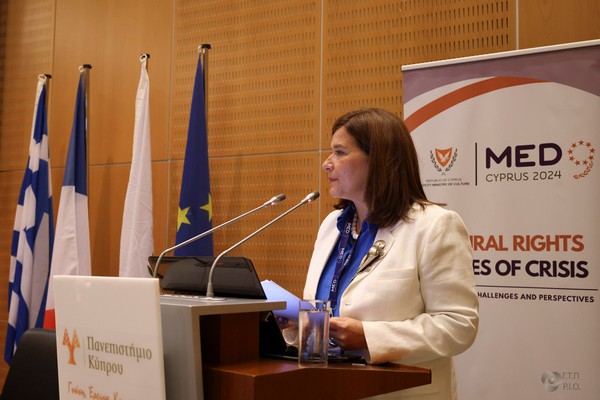Press Releases

16-09-2024 17:41
Address by the Deputy Minister of Culture, Dr Vasiliki Kassianidou at the Conference “Cultural Rights in Times of Crisis – Contemporary Challenges and Perspectives”, in Lefkosia
It is my turn to welcome you to this fascinating conference on “Cultural Rights in Times of Crisis – Contemporary Challenges and Perspectives”. The conference is organized by the Deputy Ministry of Culture in collaboration with the Organisation for European Programmes and Cultural Relations and the University of Cyprus, in the framework of the MED9 Summit.
Med9 is an initiative started in 2014 by Cyprus, in collaboration with Spain, seeking to enhance informal cooperation among Mediterranean and Southern EU member states. The member states of Med9 are Croatia, Cyprus, France, Greece, Italy, Malta, Portugal, Slovenia and Spain.
This year Cyprus holds the presidency of the Med9 and a number of ministerial meetings have already been or will be organized in the next two weeks. This afternoon I will chair an online meeting of Ministers of Culture during which we will have a policy debate to identify challenges in safeguarding cultural rights in the Mediterranean area and approaches which aim at integrating resilience-building of the cultural and creative sectors to broader human rights policies.
At the end of the meeting, we will adopt a declaration on cultural rights. The culmination of Cyprus’ presidency will be the meeting of the heads of state of the Med9, here in Cyprus in the second week of October where the results of the ministerial meetings, including our own, will be adopted.
The main purpose behind the creation of the Med9 group is to discuss issues of common interest and together to introduce them in discussions in Brussels in the framework of the developing agenda of the EU.
Bringing culture to the forefront of political debate undoubtedly is a matter of common interest for all states in the Med9, as is the safeguarding of culture in times of crisis. Over the last years there have been several periods and facets of crisis, brought forth by the accelerating pace of political, economic, climatic, and technological challenges. This is a theme I would like to explore further during Cyprus’ EU presidency in the first half of 2026.
In times of crisis, it is even more crucial that steps are taken for the protection of cultural rights and the recognition that cultural rights are relevant in many current debates such as sustainable development.
The choice of the subject of the conference and the policy debate is not circumstantial. This past July marked five decades since the invasion and illegal occupation of Cyprus by Turkey. Apart from the loss of human lives and material goods and the fact that over 36% of the territory of the Republic of Cyprus remains occupied by the Turkish Army until today, there is a clear infringement of the cultural rights of Cypriots: our cultural heritage suffers from the ongoing looting, destruction, theft and illegal export while Cypriots are not allowed to live in their homes or use freely their places of worship that are in the occupied part of the island.
The Deputy Ministry through the Department of Antiquities strives to monitor illicit excavations in the occupied territory, and the looting and trafficking of antiquities and religious relics. You will hear more about these actions from the Director of the Department of Antiquities later today.
In 2024 we also celebrate the twentieth anniversary of our accession to the European Union. Europe is where Cyprus has historically and culturally always belonged. Since ancient times the island was considered as the Eastern most boundary of Europe and always acted as the bridge between Europe and the Middle East.
As the Eastern Mediterranean is now once again in turmoil, Cyprus would like to step up and take action acknowledging the political urgency of safeguarding cultural rights in times of crisis.
We will hear a lot more about Cultural rights from our keynote speaker, the United Nations Special Rapporteur in the field of Cultural Rights, Professor Alexandra Xanthaki. I met Prof. Xanthaki last year during an event co-organized by the Permanent Mission of Cyprus in Geneva.
The Permanent Mission of Cyprus in Geneva for several years now has been actively supporting the UN Mandate for Cultural Rights and has led an initiative on cultural rights and the protection of cultural heritage in the Human Rights Council. Namely a Joint Statement was prepared and delivered by the Permanent Representative of Cyprus in the 31st session of the HRC in March of 2016, focusing on the detrimental impact that destruction of cultural heritage has on cultural rights. The Joint Statement was co-sponsored by an unprecedented number of 146 Member and Observer States.
The meeting in Geneva, where I also met one of our other expert speakers, Dragana Korljan from the office of High Commissioner for Human Rights, is what convinced me that the newly established Deputy Ministry of Culture can and should do more to support the Mandate for Cultural Rights.
It is for this reason that I asked the help of Prof. Xanthaki to draft the declaration for Cultural Rights that will be discussed and adopted by the Ministers of Culture of the MED9 this afternoon. I would like therefore to take this opportunity to sincerely thank her, because without her it would not have been possible to prepare the declaration. The final version of the text is the product of collaborative work between the teams of all member states of the Med9. I would also like express my thanks to the Ministry of Foreign Affairs of the Republic of Cyprus for their support during the preparations for the Declaration.
I am indebted to Dr Aristotelis Constantinides Associate Professor of International Law and Human Rights, in the Department of Law of the University of Cyprus, who accepted to join forces with the Unit of European and International Affairs of the Deputy Ministry of Culture, to prepare the fascinating program of the conference and to bring together the esteemed speakers, each of them an expert on different aspects related to Cultural Rights. His input has been invaluable.
The conference was organized in collaboration with the Organisation for European Programmes and Cultural Relations the staff of which took over all the practical matters regarding the conference. I thank them for all their work.
Last but not least, I would like to sincerely thank the Permanent Secretary of the Deputy Ministry of Culture, Emmanuela Lambrianides, for her invaluable help and support all throughout, and Dr Elena Theodoulou and her team in the Unit of European and International Affairs who for the last six months have been working intensely on the Declaration, the Conference, and the Ministerial Meeting.
Finally, I would like to thank our speakers and all of you for being with us here today.
(EK)
Relevant Press Releases



22-11-2024 11:25
The “Royal Chapel” of Agia Aikaterini at Pyrga closed for the public




